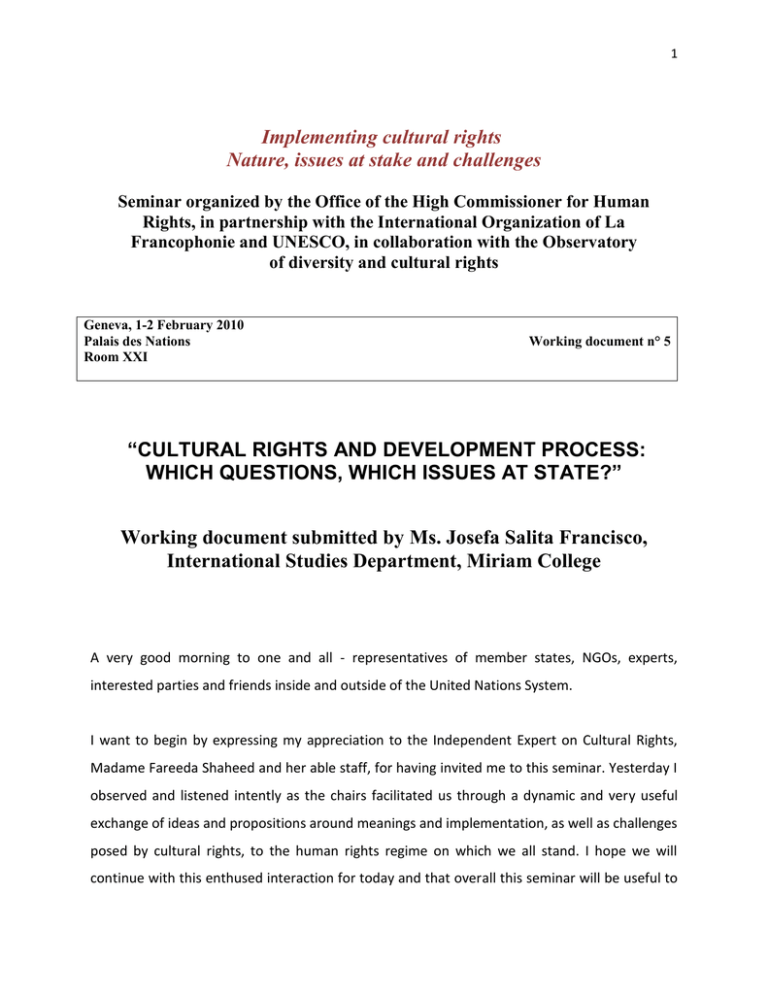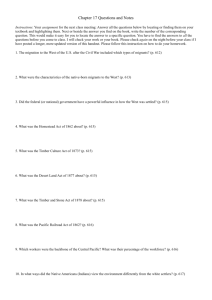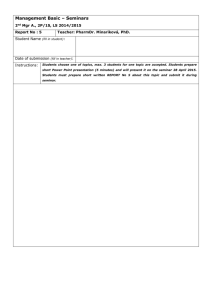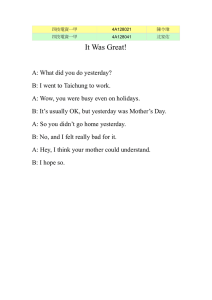Implementing cultural rights Nature, issues at stake and challenges
advertisement

1 Implementing cultural rights Nature, issues at stake and challenges Seminar organized by the Office of the High Commissioner for Human Rights, in partnership with the International Organization of La Francophonie and UNESCO, in collaboration with the Observatory of diversity and cultural rights Geneva, 1-2 February 2010 Palais des Nations Room XXI Working document n° 5 “CULTURAL RIGHTS AND DEVELOPMENT PROCESS: WHICH QUESTIONS, WHICH ISSUES AT STATE?” Working document submitted by Ms. Josefa Salita Francisco, International Studies Department, Miriam College A very good morning to one and all - representatives of member states, NGOs, experts, interested parties and friends inside and outside of the United Nations System. I want to begin by expressing my appreciation to the Independent Expert on Cultural Rights, Madame Fareeda Shaheed and her able staff, for having invited me to this seminar. Yesterday I observed and listened intently as the chairs facilitated us through a dynamic and very useful exchange of ideas and propositions around meanings and implementation, as well as challenges posed by cultural rights, to the human rights regime on which we all stand. I hope we will continue with this enthused interaction for today and that overall this seminar will be useful to 2 Madame Shaheed as she sets out to clarify the details of her work and deliverables within the possibilities offered by her mandate. I have been tasked to engage with a very specific question, that is: What are the questions we can ask and which issues are at stake in linking cultural rights and development processes? I want to begin by saying that I know more about development than I do about cultural rights. Nevertheless I had been involved with other feminist activists in efforts at interlinking agreements from the human rights platform and those coming out of economic development platforms within and outside the UN. It is from this vantage point that I had come to engage with you and why I feel very privileged to have sat through yesterday’s proceedings. Let me first open a discussion on the idea of a “cultural approach to development” that is found in the UNESCO Report Investing on Cultural Diversity and Intercultural Dialogue. I quote: “A cultural approach sets out to systematically engage with the “webs of significance” that people create; it takes account of the cultural context in which communities and groups exist; it negotiates with local social hierarchies and living patterns; and it draws on local forms of communication and expression to engage people” (Gould, 2007 cited in UNESCO 2009, p. 193). One may ask: How can we ensure that the cultural approach to development enhances a human rights based conception of development and its outcomes? Drawing on Benhabib (1995), a cultural approach that is not sensitive to the asymmetries and exclusions arising from unequal gender, sexuality, caste, ethnic and class relations and the struggles generated around challenging these forms of discrimination will fail to achieve sustainable development outcomes for all. What happens when a cultural approach encounters a ‘crisis in tradition’ where the rules of the social structure and relations may no longer be working for everyone equally well and are contested by some members of the society, such as Bangladeshi women members refusing to follow age-old traditional practices of being kept at home because they now have to find work in the public sphere for their economically distressed households (Chen, 1995)? 3 Moreover, in our present realities of simultaneous and rapid trans-national processes and intercultural encounters, many of us have pronounced multiple and layered identities that we had constructed through our contemporary social practices, creating value systems within ourselves and others we socialize with, that are often contradictory and in tension. For instance, Troung shows that migrants from the developing countries are located in grey zones where the licit and illicit merge, where identities shift back and forth between documented and undocumented persons, and where they often weave in and out between fluid situations of choice and victimhood. A benevolent approach of helping “victimized migrants” by repatriating them back to their home countries, in many cases, run counter to what the migrants themselves perceive is good for their own emancipation and quality of life. How will the cultural approach to development take all these into account so that it could ensure that human beings – men, women, children, older persons, otherly abled persons, indigenous and racially discriminated minorities, migrants - are able to enjoy their cultural rights, particularly the still vaguely understood right to participate in cultural life? Also, which cultural life we ask, when our shared way of life with other individuals have become trans-nationalised, even de-territorialised such as through ‘real virtuality’ that we heard spoken about yesterday? Some of us may recall how ‘substitutionalism’ had taken place in the process of finalizing the text of Article 27 when cultural participation ended up in the context of the one culture of the nation-state (Stamatopoulou, 2008). Recent events have discredited the liberal view of harmony between society and the state (Fowler 2003). There is now an increasing recognition of tensions and contestations in society against the power of states and markets. One huge challenge that our Independent Expert may wish to address is problematizing how to move the clarification of cultural rights toward the direction of recognizing the pluri-cultural realities of nation-states, the positive opportunities for social progress that can be derived from contestations between states and societies and among social actors themselves, and the valuation of interplanetary dialogues. 4 I want to make a final point and this is to highlight a context for development that is at the same time relevant to our discussion on cultural rights which is that: “The world is confronted with the worst financial and economic crisis since the Great Depression. The evolving crisis, which began within the world’s major financial centres, has spread throughout the global economy, causing severe social, political, and economic impacts. This is part of paragraph 1 of the Outcome of United Nations Conference on the World Financial and Economic Crisis and its Impact on Development that was adopted in June 2009. Paragraph 3 of the same document states: “Our endeavours must be guided by the need to address the human costs of the crisis: an increase in the already unacceptable number of poor and vulnerable, particularly women and children, who suffer and die of hunger, malnutrition, and preventable or curable disease; a rise in unemployment; the reduction in access to education and health services; and the current inadequacy of social protection in many countries. Women also face greater income insecurity and increased burdens of family care. These particular human costs have serious developmental consequences on the human security of those affected. An equitable global recovery requires the full participation of all countries in shaping appropriate responses to the crisis.” I would like to leave the challenge to the Independent Expert and to all of you in this room, to try to begin thinking of a global response to this catastrophe that had emanated out of hypermarketization and financialization, utilizing a perspective of human rights with focus on our cultural rights. Under international law, five human rights are generally understood as cultural rights: (a) The right to education; (b) The right to participate in cultural life; (c) The right to enjoy the benefits of scientific progress and its applications; (d) The right to benefit from the protection of the moral and material interests resulting from any scientific, literary or artistic production of which the person is the author, and (e) The freedom for scientific research and creative activity. Can we begin to imagine an alternative institutional arrangement, economic system and governance framework wherein state obligations are clearly spelled out so that the cultural rights of individuals in pluri-cultural societies may be better protected against the onslaught of a highly predatory market forces? Can we begin to imagine new institutional 5 arrangements where we are able to make such predatory market forces accountable for excesses that violate our human rights and dignity, again from the perspective of human rights including our cultural rights? Thank you.


